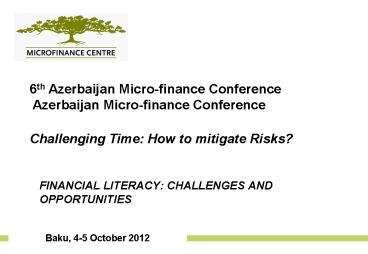Financial Literacy: challenges and opportunities - PowerPoint PPT Presentation
Title:
Financial Literacy: challenges and opportunities
Description:
... and psychological biases Policy makers To promote healthy policies that provide adequate protection of the consumer ... Savings behavior Financial ... – PowerPoint PPT presentation
Number of Views:242
Avg rating:3.0/5.0
Title: Financial Literacy: challenges and opportunities
1
Financial Literacy challenges and opportunities
Financial Literacy challenges and opportunities
Financial Literacy challenges and opportunities
Financial Literacy challenges and opportunities
Financial Literacy challenges and opportunities
6th Azerbaijan Micro-finance Conference Azerbaija
n Micro-finance Conference Challenging Time
How to mitigate Risks?
Baku, 4-5 October 2012
2
Why financial education?
- Changes negative attitudes towards family
financial planning, promotes saving behaviors,
and introduces long-term financial planning - Prepares low-income households to be more
proactive in managing emergencies and in taking
the right debt decisions. Develops the knowledge
about safe borrowing practices - Provides knowledge necessary for the wise use of
financial services, including information about
product parameters, terminology, supply research
hints, as well as linking the use of financial
services to the family financial goals
3
Low financial capability risks
3
- Micro-level
- Lack of budget planning
- Little or no saving
- Short time horizon
- Victimization by banks/financial Institutions
- Uneducated consumer spending and borrowing
irrationally
- Macro-level
- Excessive indebtedness of the society
- Lack of saving for retirement
- Credit-led economic boom
- Lack of resources of economic growth
4
Who is it important for?
- Individuals
- To better manage own resources and protect their
assets - Financial institutions
- To develop adequate financial services taking
into account peoples limited understanding and
psychological biases - Policy makers
- To promote healthy policies that provide adequate
protection of the consumer without stifling the
development of financial markets
5
Use of finance from passive payment to active
management
- Transitional and emerging economy adds complexity
and urgency to financial education - Market economy requires active use of financial
markets and instruments - Little knowledge of financial management from
previous system - Financial markets evolved much faster than human
understanding and adaptation to their use - Few options to learn about financial management
6
Level of financial education
- Financial capabilities differ across countries
and within each country - Many factors influence financial management
skills - Level of education
- Cognitive skills in particular numeracy skills
- Certain personal characteristics (e.g., locus of
control) - Level of development of financial markets
- Household organization
- Cultural norms
7
Financial capability segmentation
7
- Involvement in key three financial behaviors
(planning, expense tracking, savings)
8
Savings behavior
8
- In general people save (too) little both for
short term precautionary reasons and longer term
goals - Savings rates increased during the financial
crisis - EU average 15
- Why low savings
- Remittances may crowd out savings (Tajikistan)
- Easy access to credit services (Hungary)
- Social protection policy
- Family structure and lifestyle
9
Financial education program at MFC
- Educational tools
- Plan your future fundamentals of financial
education - Debt management module
- Risk management and insurance module
- Remittance module
- Counseling tool
- Communication campaigns/ conferences
- Financial capability studies
- Stakeholder mapping studies/ country strategies
- Assistance with national strategies for financial
education - Countries in Transition
- Armenia, Azerbaijan, Belarus, Bulgaria, Georgia,
Hungary, Kyrgyzstan, Kazakhstan, Macedonia,
Moldova, Poland, Romania, Slovakia, Russia,
Ukraine, Uzbekistan, Tajikistan
10
MFCs framework for financial education
10
Classroom training Workshops Seminars
Financial counseling
Delivery Intensity Low
High
Reminders In-line messaging Social campaign
Matched savings/ IDAs Lotteries
Educational games
Low
High Engagement
Intensity
11
Who and how is involved in FE
11
- Macro level (central banks, regulators,
ministries, etc.) - Mezo level (networks, meso level organizations,
country level NGOs) - Micro level (service delivery counseling, credit
counseling) financial institutions, NGOs,
schools, government structures
12
Information campaign - development of AMFA
financial education booklets
- EFSE funded collaboration of MFC and AMFA on
educational booklets - savings booklet
- explaining important features of banks services
fixed vs. flexible deposit - Clients rights
- explaining an importance of saving
13
Information campaign - development of AMFA
financial education booklets
- debt and overindebtedness booklet
- What is the loan and how to compare different
loans? - When a client should not take a loan?
- Rules of a wise borrowing
- What is overi-ndebtedness and how to avoid it?
- budgeting booklet
- Show in few steps how to manage in a proper way
the household budget - Set financial goal Calculate an
income plan expenses calculate
expected savinng for each month - Make financial smart decision
14
Policy recommendations
- Financial education is a worthwhile investment in
human capital - Personal financial capability
- Broad financial system stability
- Longer term perspective needed
- Basic financial literacy of the population
- Diverse channels of education, communication and
influence - Innovations to keep pace with the changes in
financial markets - Research and on-going monitoring
- Search for a good teachable moment to advocate
financial education
15
Microfinance Centre Koszykowa 60/62 m. 52 00-673
Warsaw, Poland Tel. 48 22 622 34 65 Fax 48
22 622 34 85 www.mfc.org.pl kasia_at_mfc.org.pl
- Microfinance Centre
- Koszykowa 60/62 m. 52
- 00-673 Warsaw, Poland
- Tel. 48 22 622 34 65
- Fax 48 22 622 34 85
- e-mail microfinance_at_mfc.org.pl
- www.mfc.org.pl
Thank you!































